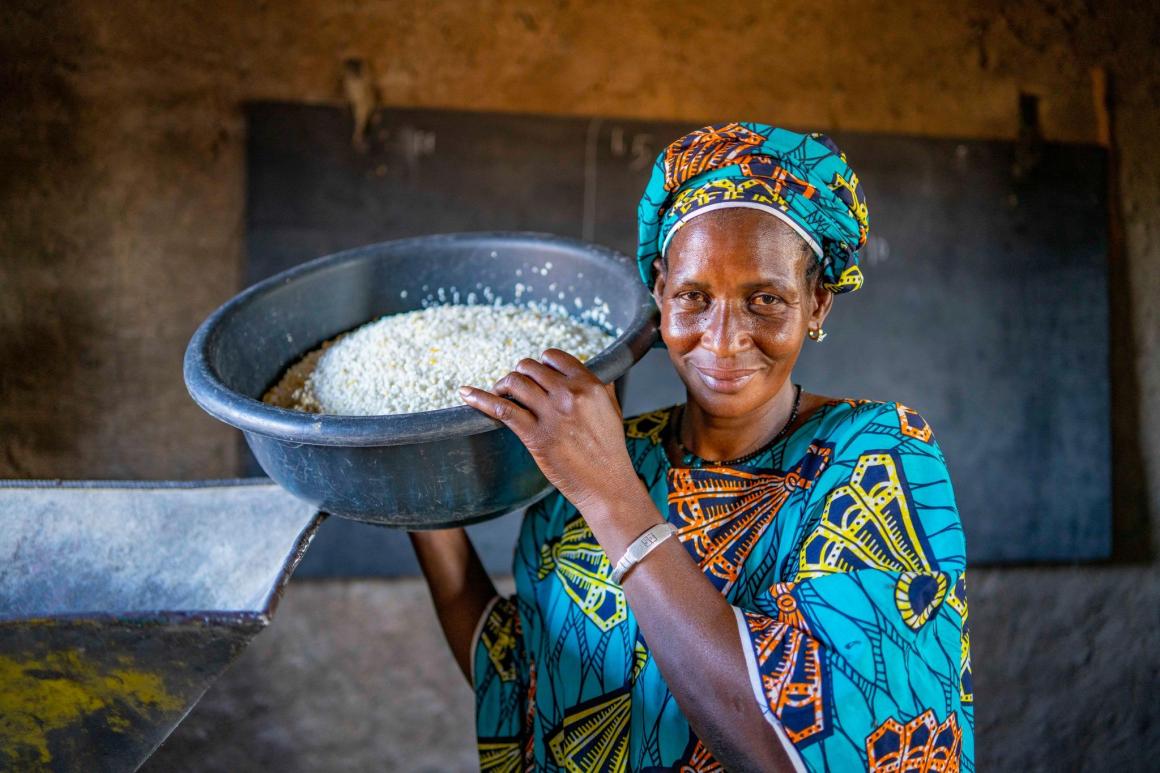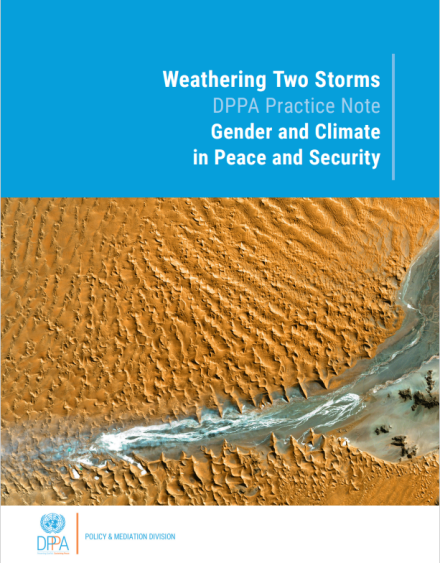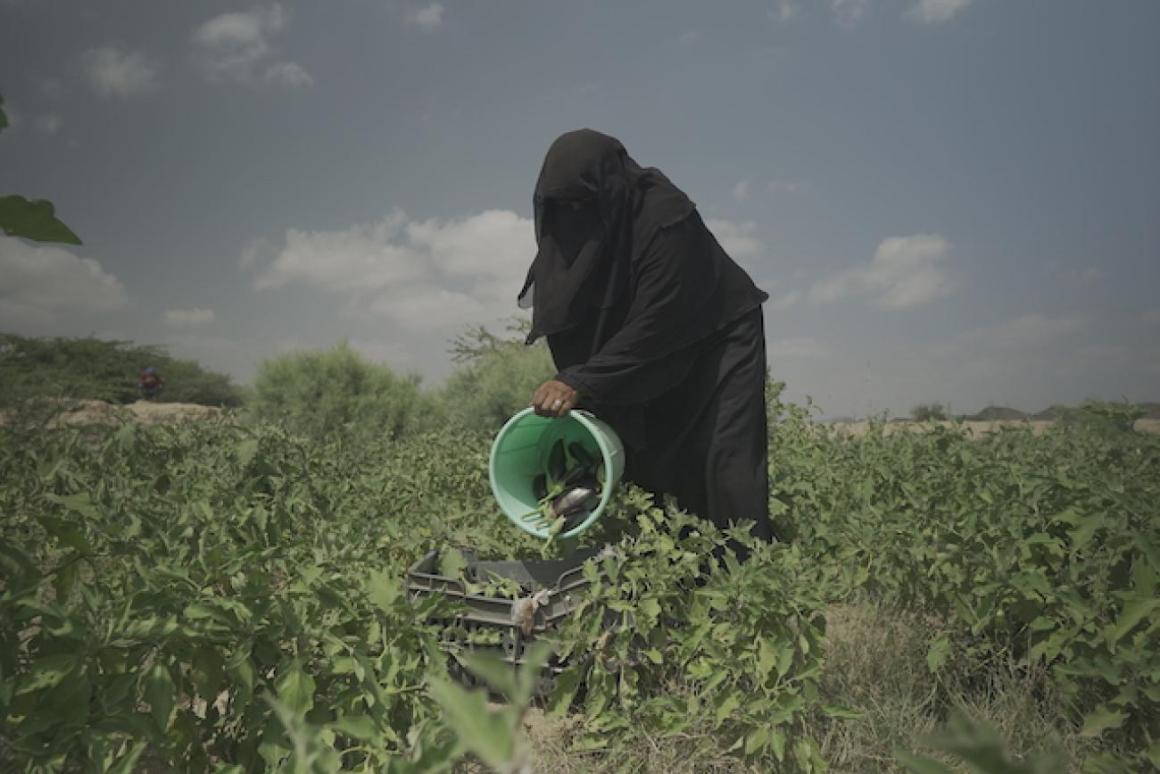
Women, Peace and Security (WPS) first made it on to the Security Council’s agenda in 2000, with the adoption of Security Council Resolution 1325 on WPS. However, despite many global and regional commitments and initiatives, the number of women included in formal peacemaking processes remains low; and many peace agreements do not include gender provisions that sufficiently address women’s security and peacebuilding needs.
Understanding and unpacking the confluence of gender and climate in peace and security, including different ways in which peace and security, climate change, and gender can intersect, has become increasingly important in conflict and political analysis, in identifying peacemaking and peacebuilding opportunities, and in building resilient, peaceful, and inclusive societies.

“Weathering Two Storms” Practice Note
“Weathering Two Storms”, published in November 2022, is a practice note from the UN Department of Political and Peacebuilding Affairs (DPPA) that analyses the connections between gender and climate in relation to peace and security.
After introducing the topic, the practice note looks at the following areas: context: interlinkages between peace and security, climate, and gender; how peace and security, climate change, and gender intersect; as well as considerations for analysis and action.
“In many places,” the practice note states, “climate impacts are compounding existing grievances and exacerbating pre-existing vulnerabilities, including those linked to gender and social inequity.” Find out more in the practice note.
FAO's Innovative Gender-Inclusive Environmental Peacebuilding

The Food and Agriculture Organization of the United Nations (FAO) published a video in August 2018 titled “FAO Innovative Approach to Resolve Land and Water Conflict in Yemen.” They state, “[Yemen] has become increasingly unstable since the conflict escalated dramatically in mid-March 2015, severely disrupting the economy, including the agricultural sector. Water scarcity in Yemen remains one of the main challenges in the agriculture sector. The unavailability of water for agricultural practices is the most limiting factor for food security. In light of this alarming situation, FAO is empowering 38 water user associations to promote better water management and reduce local conflicts over water resources.”
Find out more in the video.
Women's Peace and Humanitarian Fund

The United Nations Women’s Peace and Humanitarian Fund (WPHF) supports local and grassroots women’s civil society leaders and their organizations in conflict and crisis settings worldwide. WPHF mobilizes and channels flexible and quality funding and capacity support to women peacebuilders, humanitarians and human rights defenders working at the forefront of Women Peace Security and Humanitarian Action issues across the globe. Since 2016, it has supported over 1,300 organizations and 500 women human rights defenders across 44 conflict-affected countries.
WPHF works to address the unique needs and amplify the expert voices of frontline women civil society leaders of all ages and diversities, leveraging their added value and unlocking their power to reach the most marginalized communities and effectively break the silos between the world’s most pressing peace and security, humanitarian, development and human rights challenges.
Despite bearing the brunt of the effects of climate change, women and girls remain undervalued and underrepresented in key decision-making processes related to climate change and resource management. This, in turn, results in policies and programs that fail to adequately address their needs, leading to further inequalities and the exacerbation of existing conflicts.
Women’s equal and meaningful participation is vital for sustaining long-lasting peace and addressing the escalating climate-related security risks at community level. It is imperative that the Women, Peace and Security agenda considers climate change as a security issue, acknowledging and strengthening this triple nexus (climate-gender-conflict) and considering the immediate and longer-term effects on women’s lives. In order to do so, providing quality, flexible, and timely financing to women’s civil society organizations already on the front lines of this response is critical to enable their active participation in climate, peace and security efforts.
At COP28, WPHF launched its Funding Initiative on Women and Climate Security to promote local women’s leadership to respond to climate-related conflicts and injustice. The initiative provides funding to local women’s civil society organizations to prevent and respond to climate-related conflicts and injustice via programmatic grants of up to USD 200,000 and flexible intuitional funding of up to USD 30,000. Organizations can apply via country-based, time-bound Calls for Proposals. WPHF is extending the geographic scope and reach of this Funding Initiative and calls on further investments in women and girls at the forefront of climate, peace and security action with a dedicated Climate Security Funding Appeal.
Through its Funding Window for Women Human Right Defenders, WPHF supports individuals and delegations from or working in crisis and conflict affected countries who promote human rights and inclusive peace. Support includes coverage of travel and related logistical expenses for advocacy support to influence decision-making events and safety net funding to cover urgent safety and security needs of at risk women human rights defenders (max. USD 10,000). Individuals and delegations, including environmental defenders, can apply via the WPHF website on a rolling basis.
